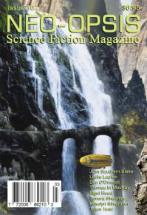"Moby’s Riff" by Roselyn Silverman
"Hack Writer" by Julian Todd
"A Moment of Dying" John Southern Blake
"The Honeymoon" Nigel Read
"In Human Judgment" Thomas M. MacKay
"The Posthomo" by Leslie Lupien
It’s the longer content that marks issue ten as a winner, and "Moby’s Riff" by Roselyn Silverman envelopes the reader into true science fiction immersion. The Space Corporation hauls a musician into a first-contact situation. While the story doesn’t bring anything original to the genre, it does succeed in entertaining the reader and creating an identifiable protagonist.
"Hack Writer" by Julian Todd works even against the ragged structure of its narrative. That said, I do have to mention that the sloppy style might be intentional, as the story is told from our protagonist’s (the hack writer’s) point of view. A hyper-intelligent race captures a writer and forces him to create awful novels for their entertainment. In an ironic twist, the idiocy of his work helps the race reach new levels of intelligence. Perhaps this explains all those Gor novels by John Norman…
The best written and my favorite story in this issue is "A Moment of Dying" by John Southern Blake. Still, I wouldn’t call this science fiction but more of a modern spec-fic piece examining the last few seconds of a man’s life after he’s been shot. It is well-paced, wrought with just the right balance of emotions, and a stunning conclusion that will lead any reader to appreciate the quality of Blake’s work.
"The Honeymoon" by Nigel Read is another slightly dark tale and more germane to the advertised contents of the magazine. A man relives his honeymoon over and over again. Not a bad deal, when you think about it, even after the truth of the situation is brought to light. The story feeds off the whole "What if we’re just living a dream and aren’t really alive?" motif to good effect.
A strong contender for best of issue is "In Human Judgment" by Thomas M. MacKay. Markus Morgan, a human male, is adopted into the Loghni race at an early age and becomes a "judge" of sorts. The Loghni are respected for their wisdom, but they also have a darker, practical side that has implications way beyond the simple case he’s adjudicating. Smart, interesting, and written with a keen sense of setting, MacKay’s story will leave readers pleased.
The fiction portion of issue ten wraps up with "The Posthomo" by Leslie Lupien. One of the hallmarks of the science fiction genre is the ability to present morality tales. Lupien’s story is no exception. Humanity has created a cyborg race that they grow to fear and exile. Once you get past the recycled plot and a few illogical leaps in logic, you can enjoy this story.
It should be noted that the nonfiction in the issue is entertaining and rather lighthearted.
This is the third issue of Neo-opsis I’ve read over the past year, and issue ten definitely stands out as the best of the three.
